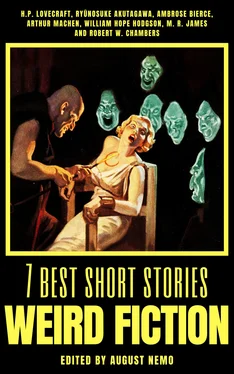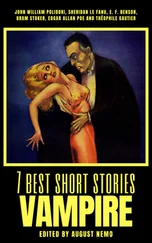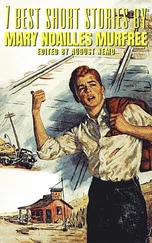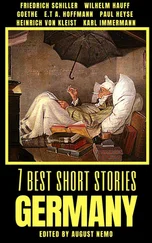“It must be allow’d, that these Blasphemies of an infernall Train of Daemons are Matters of too common Knowledge to be deny’d; the cursed Voices of Azazel and Buzrael, of Beelzebub and Belial, being heard now from under Ground by above a Score of credible Witnesses now living. I myself did not more than a Fortnight ago catch a very plain Discourse of evill Powers in the Hill behind my House; wherein there were a Rattling and Rolling, Groaning, Screeching, and Hissing, such as no Things of this Earth could raise up, and which must needs have come from those Caves that only black Magick can discover, and only the Divell unlock”.
Mr. Hoadley disappeared soon after delivering this sermon, but the text, printed in Springfield, is still extant. Noises in the hills continued to be reported from year to year, and still form a puzzle to geologists and physiographers.
Other traditions tell of foul odours near the hill-crowning circles of stone pillars, and of rushing airy presences to be heard faintly at certain hours from stated points at the bottom of the great ravines; while still others try to explain the Devil’s Hop Yard — a bleak, blasted hillside where no tree, shrub, or grass-blade will grow. Then, too, the natives are mortally afraid of the numerous whippoorwills which grow vocal on warm nights. It is vowed that the birds are psychopomps lying in wait for the souls of the dying, and that they time their eerie cries in unison with the sufferer’s struggling breath. If they can catch the fleeing soul when it leaves the body, they instantly flutter away chittering in daemoniac laughter; but if they fail, they subside gradually into a disappointed silence.
These tales, of course, are obsolete and ridiculous; because they come down from very old times. Dunwich is indeed ridiculously old — older by far than any of the communities within thirty miles of it. South of the village one may still spy the cellar walls and chimney of the ancient Bishop house, which was built before 1700; whilst the ruins of the mill at the falls, built in 1806, form the most modern piece of architecture to be seen. Industry did not flourish here, and the nineteenth-century factory movement proved short-lived. Oldest of all are the great rings of rough-hewn stone columns on the hilltops, but these are more generally attributed to the Indians than to the settlers. Deposits of skulls and bones, found within these circles and around the sizeable table-like rock on Sentinel Hill, sustain the popular belief that such spots were once the burial-places of the Pocumtucks; even though many ethnologists, disregarding the absurd improbability of such a theory, persist in believing the remains Caucasian.
It was in the township of Dunwich, in a large and partly inhabited farmhouse set against a hillside four miles from the village and a mile and a half from any other dwelling, that Wilbur Whateley was born at 5 a.m. on Sunday, the second of February, 1913. This date was recalled because it was Candlemas, which people in Dunwich curiously observe under another name; and because the noises in the hills had sounded, and all the dogs of the countryside had barked persistently, throughout the night before. Less worthy of notice was the fact that the mother was one of the decadent Whateleys, a somewhat deformed, unattractive albino woman of thirty-five, living with an aged and half-insane father about whom the most frightful tales of wizardry had been whispered in his youth. Lavinia Whateley had no known husband, but according to the custom of the region made no attempt to disavow the child; concerning the other side of whose ancestry the country folk might — and did — speculate as widely as they chose. On the contrary, she seemed strangely proud of the dark, goatish-looking infant who formed such a contrast to her own sickly and pink-eyed albinism, and was heard to mutter many curious prophecies about its unusual powers and tremendous future.
Lavinia was one who would be apt to mutter such things, for she was a lone creature given to wandering amidst thunderstorms in the hills and trying to read the great odorous books which her father had inherited through two centuries of Whateleys, and which were fast falling to pieces with age and wormholes. She had never been to school, but was filled with disjointed scraps of ancient lore that Old Whateley had taught her. The remote farmhouse had always been feared because of Old Whateley’s reputation for black magic, and the unexplained death by violence of Mrs Whateley when Lavinia was twelve years old had not helped to make the place popular. Isolated among strange influences, Lavinia was fond of wild and grandiose day-dreams and singular occupations; nor was her leisure much taken up by household cares in a home from which all standards of order and cleanliness had long since disappeared.
There was a hideous screaming which echoed above even the hill noises and the dogs’ barking on the night Wilbur was born, but no known doctor or midwife presided at his coming. Neighbours knew nothing of him till a week afterward, when Old Whateley drove his sleigh through the snow into Dunwich Village and discoursed incoherently to the group of loungers at Osborne’s general store. There seemed to be a change in the old man — an added element of furtiveness in the clouded brain which subtly transformed him from an object to a subject of fear — though he was not one to be perturbed by any common family event. Amidst it all he showed some trace of the pride later noticed in his daughter, and what he said of the child’s paternity was remembered by many of his hearers years afterward.
‘I dun’t keer what folks think — ef Lavinny’s boy looked like his pa, he wouldn’t look like nothin’ ye expeck. Ye needn’t think the only folks is the folks hereabouts. Lavinny’s read some, an’ has seed some things the most o’ ye only tell abaout. I calc’late her man is as good a husban’ as ye kin find this side of Aylesbury; an’ ef ye knowed as much abaout the hills as I dew, ye wouldn’t ast no better church weddin’ nor her’n. Let me tell ye suthin — some day yew folks’ll hear a child o’ Lavinny’s a-callin’ its father’s name on the top o’ Sentinel Hill!’
The only person who saw Wilbur during the first month of his life were old Zechariah Whateley, of the undecayed Whateleys, and Earl Sawyer’s common-law wife, Mamie Bishop. Mamie’s visit was frankly one of curiosity, and her subsequent tales did justice to her observations; but Zechariah came to lead a pair of Alderney cows which Old Whateley had bought of his son Curtis. This marked the beginning of a course of cattle-buying on the part of small Wilbur’s family which ended only in 1928, when the Dunwich horror came and went; yet at no time did the ramshackle Whateley barn seem overcrowded with livestock. There came a period when people were curious enough to steal up and count the herd that grazed precariously on the steep hillside above the old farm-house, and they could never find more than ten or twelve anaemic, bloodless-looking specimens. Evidently some blight or distemper, perhaps sprung from the unwholesome pasturage or the diseased fungi and timbers of the filthy barn, caused a heavy mortality amongst the Whateley animals. Odd wounds or sores, having something of the aspect of incisions, seemed to afflict the visible cattle; and once or twice during the earlier months certain callers fancied they could discern similar sores about the throats of the grey, unshaven old man and his slattemly, crinkly-haired albino daughter.
In the spring after Wilbur’s birth Lavinia resumed her customary rambles in the hills, bearing in her misproportioned arms the swarthy child. Public interest in the Whateleys subsided after most of the country folk had seen the baby, and no one bothered to comment on the swift development which that newcomer seemed every day to exhibit. Wilbur’s growth was indeed phenomenal, for within three months of his birth he had attained a size and muscular power not usually found in infants under a full year of age. His motions and even his vocal sounds showed a restraint and deliberateness highly peculiar in an infant, and no one was really unprepared when, at seven months, he began to walk unassisted, with falterings which another month was sufficient to remove.
Читать дальше

![Коллектив авторов - Best Short Stories [С англо-русским словарем]](/books/26635/kollektiv-avtorov-best-short-stories-s-anglo-thumb.webp)










